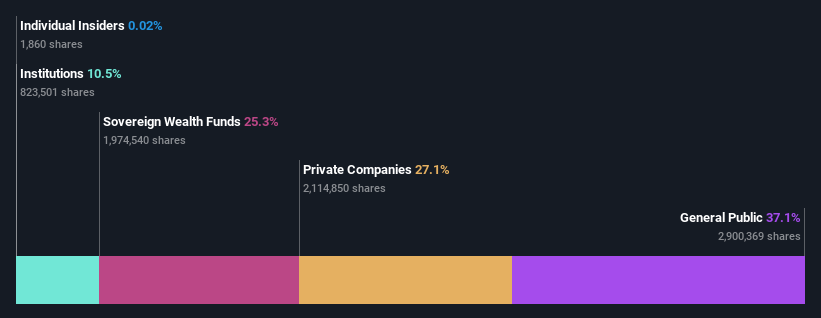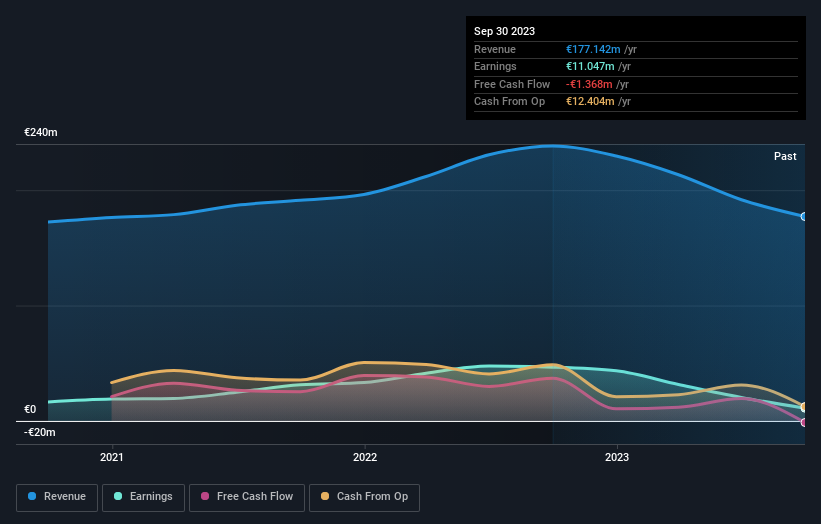Stock Analysis
Retail investors in Cinkarna Celje, d. d. (LJSE:CICG) are its biggest bettors, and their bets paid off as stock gained 11% last week

Key Insights
- The considerable ownership by retail investors in Cinkarna Celje d. d indicates that they collectively have a greater say in management and business strategy
- The top 3 shareholders own 51% of the company
- Institutional ownership in Cinkarna Celje d. d is 11%
Every investor in Cinkarna Celje, d. d. (LJSE:CICG) should be aware of the most powerful shareholder groups. And the group that holds the biggest piece of the pie are retail investors with 37% ownership. That is, the group stands to benefit the most if the stock rises (or lose the most if there is a downturn).
Clearly, retail investors benefitted the most after the company's market cap rose by €18m last week.
Let's take a closer look to see what the different types of shareholders can tell us about Cinkarna Celje d. d.
See our latest analysis for Cinkarna Celje d. d

What Does The Institutional Ownership Tell Us About Cinkarna Celje d. d?
Many institutions measure their performance against an index that approximates the local market. So they usually pay more attention to companies that are included in major indices.
We can see that Cinkarna Celje d. d does have institutional investors; and they hold a good portion of the company's stock. This suggests some credibility amongst professional investors. But we can't rely on that fact alone since institutions make bad investments sometimes, just like everyone does. When multiple institutions own a stock, there's always a risk that they are in a 'crowded trade'. When such a trade goes wrong, multiple parties may compete to sell stock fast. This risk is higher in a company without a history of growth. You can see Cinkarna Celje d. d's historic earnings and revenue below, but keep in mind there's always more to the story.

Cinkarna Celje d. d is not owned by hedge funds. Our data shows that Slovenian Sovereign Holding, d.d. is the largest shareholder with 25% of shares outstanding. For context, the second largest shareholder holds about 21% of the shares outstanding, followed by an ownership of 4.7% by the third-largest shareholder.
To make our study more interesting, we found that the top 3 shareholders have a majority ownership in the company, meaning that they are powerful enough to influence the decisions of the company.
While studying institutional ownership for a company can add value to your research, it is also a good practice to research analyst recommendations to get a deeper understand of a stock's expected performance. Our information suggests that there isn't any analyst coverage of the stock, so it is probably little known.
Insider Ownership Of Cinkarna Celje d. d
While the precise definition of an insider can be subjective, almost everyone considers board members to be insiders. The company management answer to the board and the latter should represent the interests of shareholders. Notably, sometimes top-level managers are on the board themselves.
Most consider insider ownership a positive because it can indicate the board is well aligned with other shareholders. However, on some occasions too much power is concentrated within this group.
Our data suggests that insiders own under 1% of Cinkarna Celje, d. d. in their own names. We do note, however, it is possible insiders have an indirect interest through a private company or other corporate structure. It appears that the board holds about €42k worth of stock. This compares to a market capitalization of €178m. Many investors in smaller companies prefer to see the board more heavily invested. You can click here to see if those insiders have been buying or selling.
General Public Ownership
The general public-- including retail investors -- own 37% stake in the company, and hence can't easily be ignored. While this size of ownership may not be enough to sway a policy decision in their favour, they can still make a collective impact on company policies.
Private Company Ownership
We can see that Private Companies own 27%, of the shares on issue. It's hard to draw any conclusions from this fact alone, so its worth looking into who owns those private companies. Sometimes insiders or other related parties have an interest in shares in a public company through a separate private company.
Next Steps:
I find it very interesting to look at who exactly owns a company. But to truly gain insight, we need to consider other information, too. Case in point: We've spotted 3 warning signs for Cinkarna Celje d. d you should be aware of, and 2 of them make us uncomfortable.
Of course this may not be the best stock to buy. So take a peek at this free free list of interesting companies.
NB: Figures in this article are calculated using data from the last twelve months, which refer to the 12-month period ending on the last date of the month the financial statement is dated. This may not be consistent with full year annual report figures.
Valuation is complex, but we're helping make it simple.
Find out whether Cinkarna Celje d. d is potentially over or undervalued by checking out our comprehensive analysis, which includes fair value estimates, risks and warnings, dividends, insider transactions and financial health.
View the Free AnalysisHave feedback on this article? Concerned about the content? Get in touch with us directly. Alternatively, email editorial-team (at) simplywallst.com.
This article by Simply Wall St is general in nature. We provide commentary based on historical data and analyst forecasts only using an unbiased methodology and our articles are not intended to be financial advice. It does not constitute a recommendation to buy or sell any stock, and does not take account of your objectives, or your financial situation. We aim to bring you long-term focused analysis driven by fundamental data. Note that our analysis may not factor in the latest price-sensitive company announcements or qualitative material. Simply Wall St has no position in any stocks mentioned.
About LJSE:CICG
Cinkarna Celje d. d
A chemical-processing company, produces and markets titanium dioxide pigments in Slovenia.
Flawless balance sheet second-rate dividend payer.


